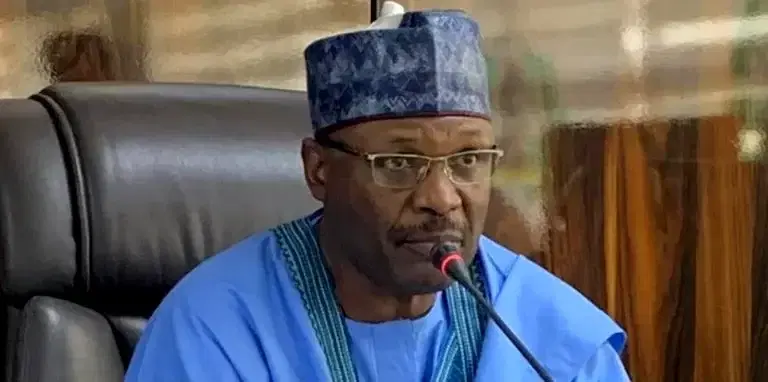The National Secretary, Coalition of United Political Parties, Peter Ameh has described the tenure of outgoing Chairman of the Independent National Electoral Commission, Prof Mahmoud Yakubu as a disastrous one .
Ameh noted that the tenure of Prof Yakubu was marked by a legacy of electoral ruin and democratic decay,only remembered as a dark chapter in Nigeria’s democratic history.
The former chairman of Inter Party Advisory Committee alleged that Yakubu’s tenure was replete with corruption, staggering incompetence, and authoritarian overreach .
Ameh further stated that ‘rather than uphold the sacred responsibility of free, fair and credible elections, his reign eroded public trust in democracy, undermined the integrity of INEC and plunged the country into a crisis of electoral fraud.
He equally alleged that Yakubu’s tenure was defined by a ‘corrosive culture of corruption and inefficiency, as INEC became a breeding ground for electoral malfeasance, vote buying and manipulation reaching unprecedent heights.’
‘The damage inflicted by Yakubu’s leadership extends beyond the electoral process to the very institution he was tasked with stewarding. INEC staff, the backbone of the commission, were treated with callous disregard, like disposable commodities.’
He disclosed that staff were’Denied promotions, basic benefits, and adequate support, employees operated in an environment of demoralization and neglect.’
Ameh added ‘This internal decay mirrored the external collapse of INEC’s credibility,’ his alleged ‘highhandedness alienated both staff and stakeholders.’
The former Presidential candiadate in the 2019 presidential election further said ‘His leadership style, characterized by arrogance and unaccountability, fostered a toxic culture that stifled dissent and rewarded sycophancy, further eroding the commission’s ability to function as an impartial arbiter of Nigeria’s elections.’
Find below the full text of Ameh’s statement to VDCInsights.
Mahmoud Yakubu’s tenure as Chairman of the Independent National Electoral Commission (INEC) will be remembered as a dark chapter in Nigeria’s democratic history. His leadership, marked by egregious corruption, staggering incompetence, and authoritarian overreach, has left an indelible stain on the nation’s electoral fabric.
Rather than upholding the sacred responsibility of ensuring free, fair, and credible elections, Yakubu’s reign eroded public trust in democracy, undermined the integrity of INEC, and plunged Nigeria into a crisis of electoral legitimacy. His abysmal performance, coupled with a blatant disregard for accountability, has not only betrayed the Nigerian people but also jeopardized the very foundations of the country’s democratic aspirations.
From the outset, Yakubu’s tenure was defined by a corrosive culture of corruption and inefficiency. Under his watch, INEC became a breeding ground for electoral malfeasance, with vote-buying and manipulation reaching unprecedented heights. The 2023 General Election, which should have been a beacon of democratic progress, instead descended into a chaotic spectacle of irregularities.
Despite an astronomical budget of over 350 billion Naira allocated for the election, Yakubu presided over a process marred by logistical failures, voter suppression, and widespread allegations of rigging. Results were delayed, polling units were mismanaged, and the electronic transmission of results—a promised cornerstone of transparency—was shambolically executed. Yet, in the face of these failures, Yakubu offered no credible explanation or accountability, leaving Nigerians disillusioned and democracy itself on life support.
The damage inflicted by Yakubu’s leadership extends beyond the electoral process to the very institution he was tasked with stewarding. INEC staff, the backbone of the commission, were treated with callous disregard, akin to disposable commodities. Denied promotions, basic benefits, and adequate support, employees operated in an environment of demoralization and neglect. This internal decay mirrored the external collapse of INEC’s credibility, as Yakubu’s highhandedness alienated both staff and stakeholders. His leadership style, characterized by arrogance and unaccountability, fostered a toxic culture that stifled dissent and rewarded sycophancy, further eroding the commission’s ability to function as an impartial arbiter of Nigeria’s elections.
Perhaps the most insidious aspect of Yakubu’s tenure was his deliberate assault on Nigeria’s multi-party democracy. By sponsoring and engineering the insertion of Section 225a into the Electoral Act, Yakubu granted INEC the power to deregister political parties of those he considers to be against him, a move that strikes at the heart of democratic pluralism. This clause, which runs counter to the spirit of Section 40 of the Nigerian Constitution guaranteeing freedom of association, represents a calculated effort to suppress political diversity and consolidate power. Such authoritarian maneuvers reveal Yakubu’s contempt for the democratic principles he was sworn to uphold, positioning him as a chief architect of Nigeria’s democratic backsliding.
The consequences of Yakubu’s failures are profound and far-reaching. Public trust in the electoral process has plummeted to historic lows, with many Nigerians now viewing democracy as a hollow ritual rather than a vehicle for meaningful change. The 2023 election, under Yakubu’s stewardship, became a symbol of betrayal, as citizens who braved long queues and security risks to cast their votes were met with a system that seemed engineered to frustrate their will. The ripple effects of this distrust threaten the stability of Nigeria’s democratic institutions, as disillusioned citizens increasingly turn away from the ballot box, leaving the nation vulnerable to apathy and unrest.
Yakubu’s legacy is not merely one of failure but of active sabotage. His tenure dismantled the fragile trust that Nigerians had in their electoral system, replacing hope with cynicism and unity with division. The 350 billion Naira allocated for the 2023 election—funds drawn from the sweat and taxes of ordinary Nigerians—was squandered on a process that failed to deliver justice or credibility. His refusal to account for these funds or address the glaring flaws in the election process is a final insult to a nation yearning for transparent governance.
As Mahmoud Yakubu exits INEC, he leaves behind a fractured institution and a nation grappling with the wreckage of his tenure. His leadership, defined by corruption, incompetence, and an unrelenting assault on democratic principles, has set Nigeria’s electoral progress back by decades. The task of rebuilding trust in INEC and restoring faith in democracy will require extraordinary effort, but it begins with acknowledging the scale of Yakubu’s failures. Nigeria deserves an electoral commission that upholds the will of the people, not one that serves as a tool for manipulation and oppression. Yakubu’s departure offers a glimmer of hope, but the scars of his tenure will linger as a clear reminder of the cost of entrusting democracy to those who betray it.
CHIEF PETER OJONUGWA AMEH
Former National Chairman, IPAC
Ex—2019 Presidential candidate
National Secretary, CUPP
Political Ecnomist, Political Party management Strategist, Governance Policy & Development analyst.

